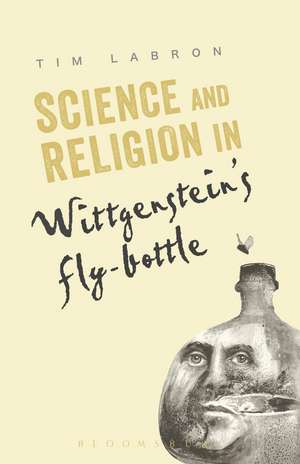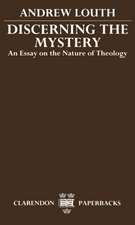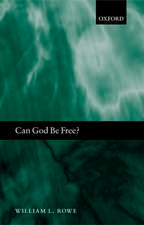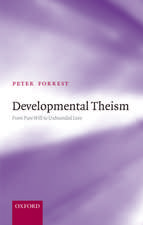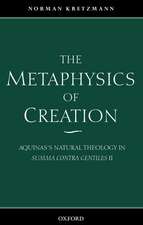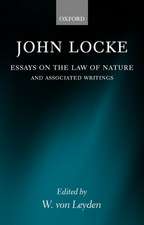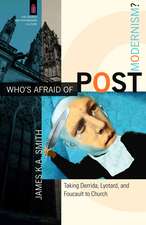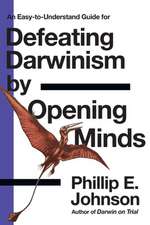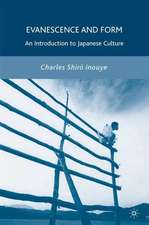Science and Religion in Wittgenstein's Fly-Bottle
Autor Dr. Tim Labronen Limba Engleză Paperback – 20 sep 2017
| Toate formatele și edițiile | Preț | Express |
|---|---|---|
| Paperback (1) | 169.16 lei 6-8 săpt. | |
| Bloomsbury Publishing – 20 sep 2017 | 169.16 lei 6-8 săpt. | |
| Hardback (1) | 565.55 lei 6-8 săpt. | |
| Bloomsbury Publishing – 20 sep 2017 | 565.55 lei 6-8 săpt. |
Preț: 169.16 lei
Preț vechi: 198.07 lei
-15% Nou
Puncte Express: 254
Preț estimativ în valută:
32.37€ • 34.61$ • 26.99£
32.37€ • 34.61$ • 26.99£
Carte tipărită la comandă
Livrare economică 17 aprilie-01 mai
Preluare comenzi: 021 569.72.76
Specificații
ISBN-13: 9781441151193
ISBN-10: 1441151192
Pagini: 148
Dimensiuni: 140 x 216 x 14 mm
Greutate: 0.18 kg
Editura: Bloomsbury Publishing
Colecția Bloomsbury Academic
Locul publicării:New York, United States
ISBN-10: 1441151192
Pagini: 148
Dimensiuni: 140 x 216 x 14 mm
Greutate: 0.18 kg
Editura: Bloomsbury Publishing
Colecția Bloomsbury Academic
Locul publicării:New York, United States
Caracteristici
Uniquely brings Wittgenstein to the science and religion debates
Notă biografică
Tim Labron is Professor of Philosophy and Religious Studies at Concordia University of Edmonton, Canada.
Cuprins
Acknowledgments1. Introduction2. Philosophy and the Fly-Bottle3. Physics and the Fly-Bottle4. Religion and the Fly-Bottle5. ConclusionBibliographyIndex
Recenzii
[A] good contribution to considerations of the relation between science and religion.
By the end of the book, one grasps a unique philosophical approach to reality itself. This alone is well worth the trip.
In an academic environment in which the name of Wittgenstein is piously honoured but his way of doing philosophy seldom put into practice, it is a pleasure to welcome Tim Labron's intervention: this lucidly argued, very readable and accessible study of much the same deep questions and permanently tempting muddles that Wittgenstein taught us how to deal with all these years ago, exposed here and resisted with such wonderful patience and clarity.
If the enemy of one's enemy is a friend, then Tim Labron has done us the great service of introducing readers to two friends whose writings expose confusions that have bewitched our contemporary culture just to the extent that we proudly consider ourselves 'scientific.' Labron endeavors to show how philosopher Ludwig Wittgenstein and quantum physicist Niels Bohr, in complementary ways, unravel the tangled skein of scientific reductionism. This richly researched volume will bring to light a radical alternative to the popular 'conflict model' that presumes science cannot help but be pitted against religion. Once the alternative model has cleared away the confusions, religion is relieved of the burden of striving for standards that science itself cannot meet precisely because those standards are unintelligible.
Labron has written a stimulating but accessible book on the supposed conflict between religion and science. He shows that the real issue is not some inevitable conflict between religion and science, but is rather a problem with clarifying for ourselves what realism in each area properly amounts to. Although Labron employs a variety of Wittgensteinian techniques in his discussion, he nowhere loses contact with the level at which the discussion matters most-the level of popular religion and popular science. He does not leave the discussion at that level but manages to lift it without losing his audience. It is worth mentioning too that Labron employs Wittgensteinian techniques but his goal is to show the fly the way out of the fly-bottle, not to entrap the fly in some form of Wittgensteinian fideism.
Tim Labron issues a refreshing and provocative call to exorcise a false gulf between the person and 'external reality,' and instead recognise how we participate in a reality which is too great, 'rough,' and 'dappled,' to be neatly reduced to simple foundations and rigid ideal laws. He invites us not only to 'escape from the fly-bottle,' but also to 'think outside the post-Cartesian box.'
By the end of the book, one grasps a unique philosophical approach to reality itself. This alone is well worth the trip.
In an academic environment in which the name of Wittgenstein is piously honoured but his way of doing philosophy seldom put into practice, it is a pleasure to welcome Tim Labron's intervention: this lucidly argued, very readable and accessible study of much the same deep questions and permanently tempting muddles that Wittgenstein taught us how to deal with all these years ago, exposed here and resisted with such wonderful patience and clarity.
If the enemy of one's enemy is a friend, then Tim Labron has done us the great service of introducing readers to two friends whose writings expose confusions that have bewitched our contemporary culture just to the extent that we proudly consider ourselves 'scientific.' Labron endeavors to show how philosopher Ludwig Wittgenstein and quantum physicist Niels Bohr, in complementary ways, unravel the tangled skein of scientific reductionism. This richly researched volume will bring to light a radical alternative to the popular 'conflict model' that presumes science cannot help but be pitted against religion. Once the alternative model has cleared away the confusions, religion is relieved of the burden of striving for standards that science itself cannot meet precisely because those standards are unintelligible.
Labron has written a stimulating but accessible book on the supposed conflict between religion and science. He shows that the real issue is not some inevitable conflict between religion and science, but is rather a problem with clarifying for ourselves what realism in each area properly amounts to. Although Labron employs a variety of Wittgensteinian techniques in his discussion, he nowhere loses contact with the level at which the discussion matters most-the level of popular religion and popular science. He does not leave the discussion at that level but manages to lift it without losing his audience. It is worth mentioning too that Labron employs Wittgensteinian techniques but his goal is to show the fly the way out of the fly-bottle, not to entrap the fly in some form of Wittgensteinian fideism.
Tim Labron issues a refreshing and provocative call to exorcise a false gulf between the person and 'external reality,' and instead recognise how we participate in a reality which is too great, 'rough,' and 'dappled,' to be neatly reduced to simple foundations and rigid ideal laws. He invites us not only to 'escape from the fly-bottle,' but also to 'think outside the post-Cartesian box.'
